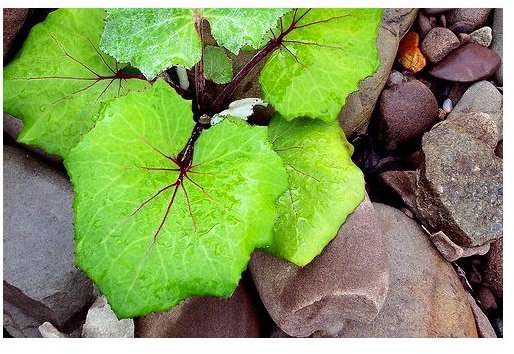The Healing Benefits of Coltsfoot Tea
Coltsfoot
Coltsfoot (Tussilago farfara), also known as coughwort, butterbur, bullsfoot, and fieldhove, is a perennial plant, native to Eastern Europe and Asia. Its growth spread to North Africa and it was brought to North America by the European colonists. Coltsfoot leaves are shaped like hooves, thus the name. These bright green, woody leaves are rich in beneficial phytochemicals including mucin, tannins, glycosidal bitter principle, and zinc. The golden-yellow flowers are rich in flavonoids and volatile oils.
Drinking coltsfoot tea has been a traditional remedy in both China and Europe for centuries. What are the benefits of coltsfoot? This herb is one of the most effective remedies for coughs, an irritated throat, and chest congestion.
Natural Remedy for Coughs
Coltsfoot has many beneficial properties that are well-suited for treating conditions related to the lungs, throat, and mouth. High in mucilage this herbs serves as a soothing demulcent, beneficial for irritated mucous membranes. It also has expectorant properties, helping to expel mucus from the lungs, while also quelling coughs as an anti-spasmodic herb. Coltsfoot is also known to reduce inflammation, again, benefiting irritated and infected lungs, but also a sore throat. High in the mineral zinc, which is necessary for healthy immune function, drinking a tea made from this herb to soothe a cough will also help to treat the cold.
How to Make a Coltsfoot Infusion
To make a tea from this herb use one teaspoon of the dried leaves or flowers. Steep in one cup of boiled water for ten minutes. Drink up to three cups a day during treatment. Coltsfoot blends well with mullein and white horehound for coughs and bronchitis.
Safety
Coltsfoot has been approved for use in Europe by the German Commission E (Europe’s regulatory body for natural medicine). In the United States however there is more hesitation with promoting coltsfoot as a safe medicinal plant because of the content of specific phytochemicals — pyrrolizidine alkaloids. These compounds may be carcinogenic and may cause liver damage. While moderate use of this plant is not a health concern it is important to be aware of the potential risk.
The German Commission E has put a recommended limit on the content of pyrrolizidine alkaloids in commercial products. With this regulation consumers can feel more comfortable with the use of coltsfoot as a medicinal herb. In the United States there is no government regulation of commercial herbal products, nor of these alkaloids. While drinking a cup of tea or more while treating bronchial problems is highly unlikely to be dangerous, prolonged use is generally recommended against. Also, if pregnant or nursing, coltsfoot should be avoided.
Coltsfoot tea is a traditional form of herbal medicine for common respiratory problems. It can benefit dry cough, asthma, bronchitis, and general irritation of the lungs, throat, and mouth. As there are warnings about the content of pyrrolizidine alkaloids, do not drink this healing tea for a long period of time.
References
Wuest, J. Richard, R, Ph. and Thomas A Gossel, R.Ph., Ph.D. “Natural Products: Coltsfoot to Cranberry.” (Continuing Education for Pharmacists) <www.nodakpharmacy.net/cem/cequiz/CE_04_2006.pdf>
Hoffmann, David. “The Complete Illustrated Holistic Herbal: A Safe and Practical Guide to Making and Using Herbal Remedies.” (Element Books, 1996).
photo by Magnolia 1000 (CC/flickr) https://www.flickr.com/photos/60548141@N00/2644899480/sizes/m/in/photostream/
Disclaimer
Please read this disclaimer regarding the information contained within this article.
